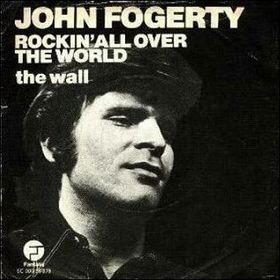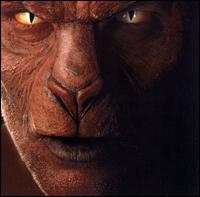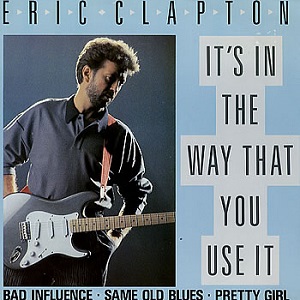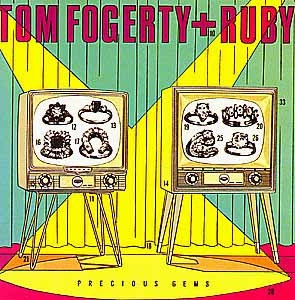| Ruby | ||||
|---|---|---|---|---|
 | ||||
| Studio album by | ||||
| Released | 1977 | |||
| Label | PBR International | |||
| Producer | Tom Fogerty | |||
| Ruby chronology | ||||
| ||||
Ruby is the debut album by American rock group Ruby, featuring Tom Fogerty. [1]
| Ruby | ||||
|---|---|---|---|---|
 | ||||
| Studio album by | ||||
| Released | 1977 | |||
| Label | PBR International | |||
| Producer | Tom Fogerty | |||
| Ruby chronology | ||||
| ||||
Ruby is the debut album by American rock group Ruby, featuring Tom Fogerty. [1]
| No. | Title | Writer(s) | Length |
|---|---|---|---|
| 1. | "Life Is But a Dream" | Randy Oda, Tom Fogerty | 3:26 |
| 2. | "Can You Really Say" | Anthony Davis | 2:37 |
| 3. | "BART" | Oda | 5:17 |
| 4. | "Starry Eyed" | Bobby Cochran | 5:12 |
| 5. | "Baby, What You Want Me to Do" | Jimmy Reed | 4:10 |
| No. | Title | Writer(s) | Length |
|---|---|---|---|
| 1. | "Running Back to Me" | Oda, Fogerty, Cochran | 7:24 |
| 2. | "Take Me Back to London" | Oda, Fogerty | 4:15 |
| 3. | "It's Taking a Long Time" | Oda | 3:42 |
| 4. | "Slippin' and Slidin'/Big Fat Woman" | Penniman, Bocage, Collins, Smith / B. Freeman | 5:08 |
The instrumental track "BART" was frequently used by the BBC to accompany test cards, during intervals between schools programmes, and over Pages from Ceefax in the late 1970s and early 1980s, and sporadically thereafter.
BART was also used for the musical highlights section of BBC's review of the 1987 Formula 1 season. [2]
When the digital switchover happened, the track was chosen to play out the last Pages from Ceefax prior to the closure of analogue teletext in the UK on BBC2, in the early morning of 22nd October 2012. [3]
A Cash Box Magazine album review dated April 9, 1977, states "It would be hard to follow the high quality work that Tom Fogerty put into Creedence Clearwater Revival but Fogerty's new band, Ruby, deserves more than a casual listen. The combined talents of this quartet are potently showcased in their ability to play fast and funky or slow and silky with equal aplomb and careful control. For AOR and top 40 playlists." [4]

Creedence Clearwater Revival, commonly abbreviated as CCR or simply Creedence, was an American rock band formed in El Cerrito, California. The band consisted of lead vocalist, lead guitarist, and primary songwriter John Fogerty, his brother, rhythm guitarist Tom Fogerty, bassist Stu Cook, and drummer Doug Clifford. These members had played together since 1959, first as the Blue Velvets and later as the Golliwogs, before settling on Creedence Clearwater Revival in 1967. The band's most prolific and successful period between 1969 and 1971 produced fourteen consecutive Top 10 singles and five consecutive Top 10 albums in the United States, two of which—Green River (1969) and Cosmo's Factory (1970)—topped the Billboard 200 chart. The band performed at the 1969 Woodstock festival in Upstate New York, and was the first major act signed to appear there.

John Cameron Fogerty is an American singer, songwriter and guitarist. Together with Doug Clifford, Stu Cook, and his brother Tom Fogerty, he founded the swamp rock band Creedence Clearwater Revival (CCR), for which he was the lead singer, lead guitarist, and principal songwriter. CCR had nine top-10 singles and eight gold albums between 1968 and 1972, and was inducted into the Rock and Roll Hall of Fame in 1993.

Thomas Richard Fogerty was an American musician, best known as the rhythm guitarist for Creedence Clearwater Revival. He was posthumously inducted into the Rock and Roll Hall of Fame in 1993.

Creedence Clearwater Revival is the debut studio album by the American rock band Creedence Clearwater Revival, released in July 1968, by Fantasy Records in the US. Featuring the band's first hit single, "Susie Q", which reached number 11 in the US charts, it was recorded shortly after the band changed its name from the Golliwogs and began developing a signature swamp rock sound.

Class of '55: Memphis Rock & Roll Homecoming is a collaborative studio album by Roy Orbison, Johnny Cash, Jerry Lee Lewis, and Carl Perkins. It was released on May 26, 1986, by America/Smash Records, a subsidiary of Polygram Records. The album was produced by Chips Moman.

"You Make Loving Fun" is a song by the British-American rock band Fleetwood Mac, written and sung by Christine McVie. It was released as the fourth and final single from the band's 1977 album Rumours. "You Make Loving Fun" peaked at number nine on the US Billboard Hot 100 and became the album's fourth top-ten hit.

"Old Time Rock and Roll" is a song written by George Jackson and Thomas E. Jones III, with uncredited lyrics by Bob Seger. It was recorded by Seger for his tenth studio album Stranger in Town. It was also released as a single in 1979. It is a sentimentalized look back at the music of the original rock 'n' roll era and has often been referenced as Seger's favorite song. The song gained renewed popularity after being featured in the 1983 film Risky Business. It has since become a standard in popular music and was ranked number two on the Amusement & Music Operators Association's survey of the Top 40 Jukebox Singles of All Time in 1996. It was also listed as one of the Songs of the Century in 2001 and ranked No. 100 in the American Film Institute's 100 Years...100 Songs poll in 2004 of the top songs in American cinema.

"Rockin' All Over the World" is a rock song written by John Fogerty, formerly of Creedence Clearwater Revival. It made its debut on Fogerty's second solo album in 1975. It was also released as a single, spending six weeks in the US top 40, peaking at #27.

"Love Is Like a Rock" is a song by American rock musician Donnie Iris from his 1981 album King Cool. The song was released as the second single from his second album.

Eye of the Zombie is the fourth solo studio album by American singer/songwriter John Fogerty. Released in September 1986, it was his first album with a backing band, and it includes the Creedence-inspired track "Change in the Weather" as well as "Wasn't That a Woman" and "Soda Pop", his first forays into 1960s-1970s Motown-sounding funk and R&B. The title track was released as a single and reached the Billboard charts.

"Lookin' out My Back Door" is a song recorded by the American band Creedence Clearwater Revival. Written by the band's lead singer, guitarist and songwriter John Fogerty, it is included on their fifth album Cosmo's Factory (1970), and became their fifth and final number-two Billboard hit, held off the top by Diana Ross's version of "Ain't No Mountain High Enough". It was their only Cash Box Top 100 number-one hit.

Sidekicks is an album by Tom Fogerty and Randy Oda. The album was recorded in 1988 and released in 1992 on Fantasy Records, two years after Fogerty's death in 1990. Due to its posthumous release, Sidekicks stands as Fogerty's final album.

Zephyr National is Tom Fogerty's third solo album. His brother John played on the album, but recorded his parts separately from former CCR band members Doug Clifford and Stu Cook on the one song on which they all performed. This marked the final recording where all four members of Creedence Clearwater Revival played on the same song.

"It's in the Way That You Use It" is a song which was written by the English rock musician Eric Clapton in collaboration with The Band's guitarist and composer Robbie Robertson. The song was recorded and performed by Eric Clapton, who released the track under licence of Warner Bros. Records as the second of four singles from his 1986 studio album August in March 1987. The song, which is used as the theme tune to the Martin Scorsese film The Color of Money, was produced by Eric Clapton himself with the help of Tom Dowd, who acted as the assistant producer. The release sold more than 500,000 copies worldwide.

Deal It Out is Tom Fogerty's fifth and final solo album, though he would release one album, Precious Gems, as "Tom Fogerty + Ruby" and record an album with Randy Oda, Sidekicks, that was released posthumously.

Precious Gems' is a compilation album by the band Ruby, containing tracks from their two studio albums from 1977 and 1978.'
Ruby was an American rock band that between 1976 and 1978 recorded two albums, Ruby and Rock & Roll Madness. In 1984, the compilation Precious Gems was released. In 1988, Randy Oda and Tom Fogerty made another album, Sidekicks, with Kevin Oda on drums, and Tom's son Jeff on bass; the album was not released until five years later, by which point Fogerty had died.

"Almost Saturday Night" is a song written by John Fogerty and first released on his 1975 album John Fogerty. It was released as a single and reached No. 78. It has been covered by a number of artists, including Dave Edmunds, who also released it as a single to more success, Gene Clark, Ricky Nelson, The Searchers, The Georgia Satellites and Ned LeDoux.

Country Girl, the third album by English singer-songwriter Rebecca Hollweg, was released on 9 February 2015 on Emu Records. The title track samples a recording of the "Mind the gap" announcement by Oswald Laurence which is used on the London Underground's Embankment station on the Northern line northbound platform to warn passengers when crossing the gap between the train and the platform.
Randy Oda is a composer and musician who performed with Tom Fogerty and the band Ruby, recording the albums Ruby, Rock & Roll Madness and Sidekicks. He composed the 1982 hit song, "Think I'm in Love", which Arnold Schwarzenegger also used on an exercise video. His "BART" instrumental was used by BBC School Music during intervals. His latest band is 'OPO.